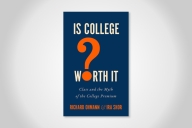You have /5 articles left.
Sign up for a free account or log in.
The conversation about the assessment of student learning in higher education has shifted somewhat in recent years. While some critics still question whether colleges are doing enough to try to understand what and how much their students learn, there is no doubt that most institutions -- often prodded by their accreditors and other external pressures -- are engaged in more activity aimed at assessing student learning.
What remains in doubt, however, is what all that activity amounts to. Are universities linking the efforts in individual programs and departments to a larger institutional strategy? Do institutions use what they learn to help instructors on the front lines improve how they teach? Are colleges giving faculty members incentives that matter to engage in meaningful assessment efforts and study their impact?
Several national groups announced a new program last fall aimed at recognizing institutions that have gone beyond sporadic efforts to assess student learning and sought to assure a more systemic, cross-campus approach that uses results to drive experimentation and change.
Today the groups -- the Association of Public and Land-grant Universities, the American Association of State Colleges and Universities, the Association of American Colleges and Universities, and the National Institute for Learning Outcomes Assessment -- are announcing the first 10 recipients of the Excellence in Assessment designation, which include a range of two-year and four-year, public, private, and for-profit institutions (full list below).
The awards have several purposes, with differing target audiences. By using a NILOA rubric that scores campuses not only on how much assessment work they are doing but on what evidence they are producing and how they are using it to review curricula and teaching practices, the groups hope to create role models for other institutions and to show skeptical policy makers and regulators how much meaningful work is being done.
"This might be a way to demonstrate meaningfully that our campuses really do take this seriously," said Teri Lyn Hinds, director of research and data policy at the Association of Public and Land-grant Universities and project manager of the Voluntary System of Accountability, which APLU and AASCU created.
Twenty-five colleges and universities sought the designation, and 10 scored high enough on all six elements of the NILOA rubric to earn the accolade.
Hinds said she was surprised by the number of participating campuses that had chosen to formally recognize and reward (sometimes in the promotion and tenure process) faculty scholarship on the teaching and learning process. "The general view is that there isn't much of that happening, and we saw quite a bit," she said.
Kansas State University, one of the designees, has made significant changes in its curriculum in response to strengths and shortcomings identified through faculty-driven assessment efforts, said Frederick Burrack, director of the assessment office and professor of music at Kansas State.
He cited one academic program whose capstone course required students to show a certain level of discipline-specific research capabilities -- a level that outcomes assessment showed few students were achieving. When faculty members in the department examined the learning outcomes in their own courses, "the conversation went something like, 'We don't teach that in our course.' 'Well, we don't teach that in our course -- we thought it was you,'" Burrack said.
"There was a recognition that the whole curriculum has to work together through communication. When they work independently, they can neglect the development of some students and some of the key proficiencies," he added. When instructors in the department reviewed the entire curriculum, they adjusted the instruction in individual courses to add certain things and took away some material that was unnecessarily duplicated.
The Excellence in Assessment designees are:
- Cameron University
- Capella University
- Community College of Baltimore County
- Indiana University-Purdue University Indianapolis
- Kansas State University
- Mills College
- Mount St. Joseph University
- Rose-Hulman Institute of Technology
- University of Wisconsin at Madison
- Zayed University








